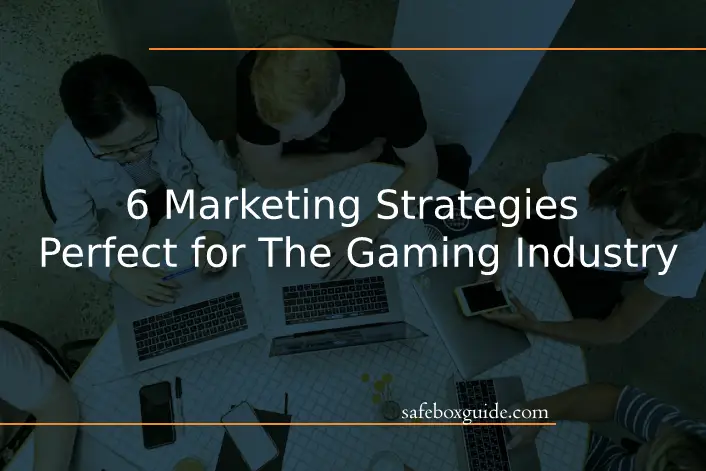The gaming industry has witnessed unprecedented growth over the past few years, becoming a major player in the entertainment sector. With this expansion comes increased competition, making innovative and effective marketing strategies more important than ever for standing out. The right marketing approach can elevate a game from obscurity to popularity, capturing the hearts and minds of gamers worldwide.
This article explores six marketing strategies tailor-made for the gaming industry. These strategies are designed to engage the gaming community, boost game visibility, and ultimately drive success in a crowded market.
Contents
1. Utilize Influencer Partnerships
The influence of well-known gamers and streamers cannot be overstated in the gaming industry. These personalities have the power to sway the opinions and preferences of millions of followers, making influencer partnerships a goldmine for game marketing. By collaborating with these influencers, companies can tap into established communities, gaining immediate visibility and credibility.
Selecting the right influencer is crucial; it’s not just about numbers but also about finding someone whose audience aligns with the game’s target demographic. Authenticity is key in these partnerships. Working with influencers to create genuine, engaging content—whether it’s game reviews, playthroughs, or exclusive sneak peeks—can encourage their audience to try the game themselves, leveraging the trust and rapport the influencer has built with their followers.
2. Leverage Specialized Talent
In the vibrant world of gaming, understanding and connecting with the community is paramount. Marketing efforts need to resonate deeply with gamers, a unique demographic known for its passion and engagement with digital content. This connection starts with having the right team in place, one that inherently understands the gaming world’s nuances, trends, and what makes gamers tick.
That’s where the importance of specialized talent comes into play. Companies should consider the strategic move to hire professionals with bachelors in game and digital media design. Individuals with this background bring a wealth of knowledge not only about game design but also about how to engage with the gaming community through compelling narratives and visuals. Their expertise ensures that marketing campaigns are not only visually appealing but also deeply rooted in the gaming culture, enhancing authenticity and effectiveness.

3. Engage Through Social Media and Online Communities
Social media platforms and online gaming communities are fertile ground for building and nurturing a loyal fanbase. These digital spaces allow for direct interaction with gamers, providing a channel to share updates, gather feedback, and engage in conversations. Effective engagement on these platforms can turn casual players into devoted fans and advocates for the game.
Crafting engaging content that resonates with the community is essential, and it might include behind-the-scenes looks at game development, Q&A sessions with the development team, or user-generated content contests. Platforms like Reddit, Discord, and Twitter offer unique ways to engage with gamers, each requiring a tailored approach. For example, Reddit values in-depth discussions and authenticity, while Twitter is all about snappy, timely interactions. Successfully managing these platforms and fostering a positive community can significantly enhance a game’s visibility and appeal.
4. Implement In-Game Advertising and Sponsorships
In-game advertising and sponsorships present a direct channel to engage with gamers within the gaming environment itself. This strategy involves placing ads or branding materials in a way that seamlessly integrates with the game’s design, ensuring that the advertising doesn’t disrupt the gaming experience. When done correctly, it can enhance the game’s realism or add value to the player’s experience, making it a win-win for both the advertiser and the gamer.
Sponsoring gaming tournaments or events is another effective way to increase brand visibility among the gaming community. These sponsorships can range from providing prize pools to offering in-game items or discounts as part of the event. The key is to ensure that the sponsorship feels like a natural part of the gaming experience and adds excitement for the participants. By associating your brand with popular gaming events, you can enhance your reputation and visibility within the gaming community.

5. Offer Exclusive Content and Previews
Creating a sense of exclusivity can generate buzz and anticipation for a game’s release. Offering exclusive content, early access, or sneak peeks can entice gamers to sign up, follow, or pre-order, leveraging their excitement to spread the word. This strategy not only rewards dedicated fans but also serves as an effective marketing tool, as those fans are likely to share their excitement and experiences with their networks.
Exclusive content can come in many forms, such as special in-game items, early beta access, or behind-the-scenes content that gives fans a glimpse into the development process. The goal is to make fans feel valued and part of an exclusive club, which in turn fosters loyalty and long-term engagement with the game. Encouraging pre-orders or sign-ups in exchange for exclusive benefits can also provide an early indicator of the game’s potential success.
6. Capitalize on Cross-Promotion and Collaborations
Cross-promotion and collaborations with other brands, games, or media properties can expand a game’s reach beyond its traditional audience. This strategy involves partnering with complementary brands to create co-branded content, special editions, or in-game events that appeal to both fanbases. The key to successful cross-promotion is finding partners with aligned interests and audiences, ensuring that the collaboration feels natural and adds value to the players.
Successful cross-promotions can introduce your game to potential players who might not have discovered it otherwise. For example, a collaboration between a popular gaming franchise and a movie series can create exciting new content that appeals to fans of both, generating buzz and interest. By carefully selecting partners and designing collaborations that truly resonate with the target audience, businesses can create synergies that amplify their marketing efforts and drive engagement.
Conclusion
Marketing strategies in the gaming industry require creativity, innovation, and a deep understanding of the gaming community. By leveraging specialized talent, embracing influencer partnerships, engaging with social media and online communities, implementing in-game advertising and sponsorships, offering exclusive content, and capitalizing on cross-promotion and collaborations, gaming companies can create powerful marketing campaigns that resonate with gamers. These strategies not only help to promote individual games but also build a strong, engaged community of fans. In the competitive gaming market, standing out requires more than just a great product; it demands a marketing approach that connects with gamers on a meaningful level. As the industry continues to evolve, so too must the marketing strategies used to capture the attention and imagination of gamers worldwide.

